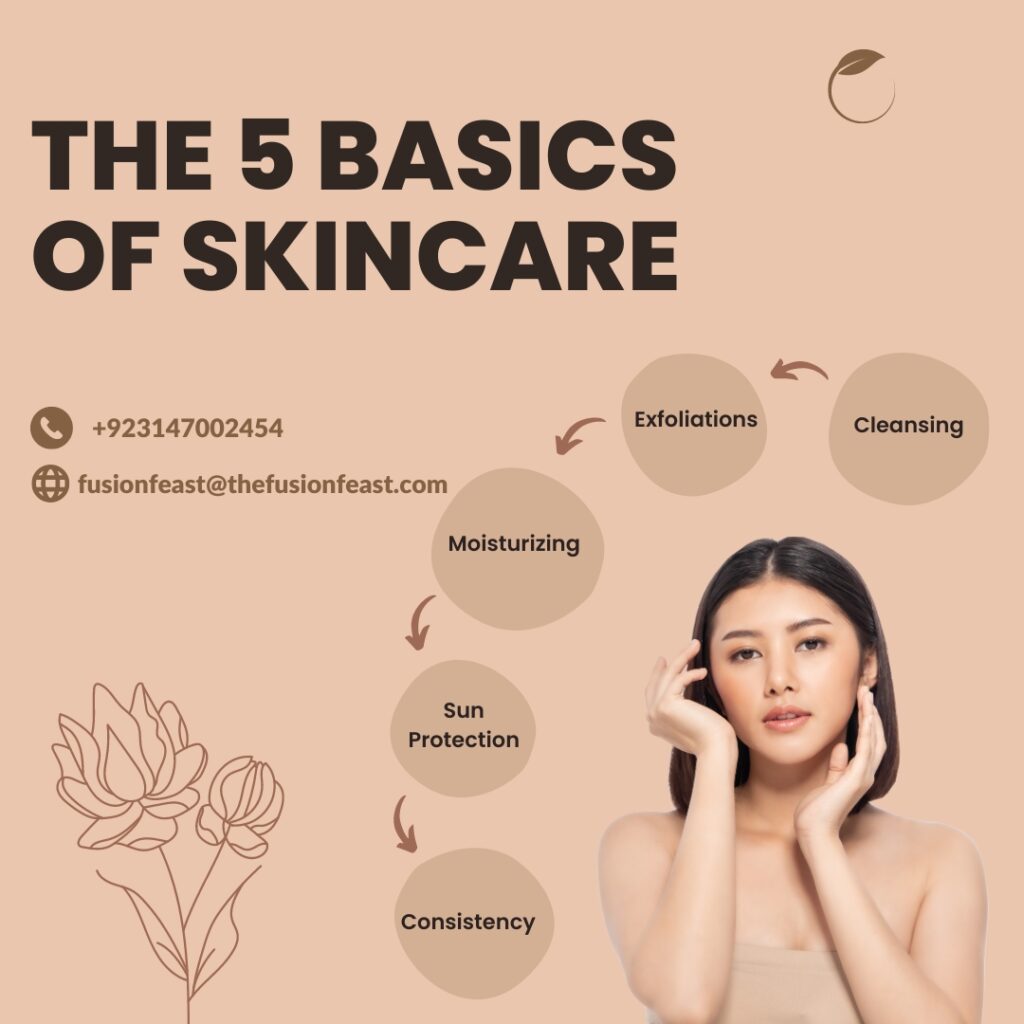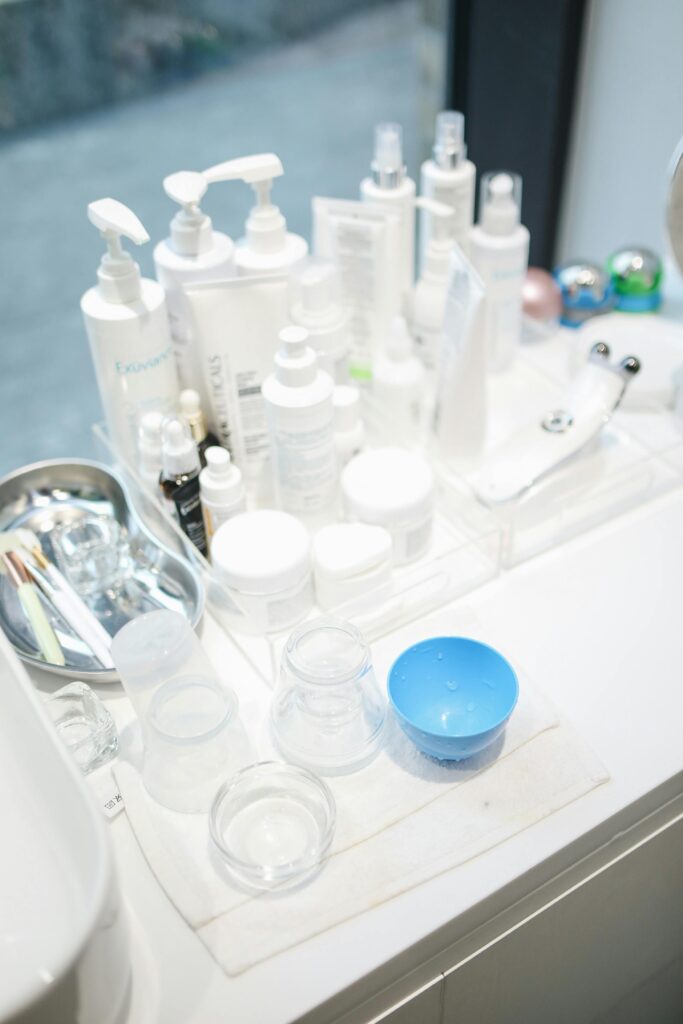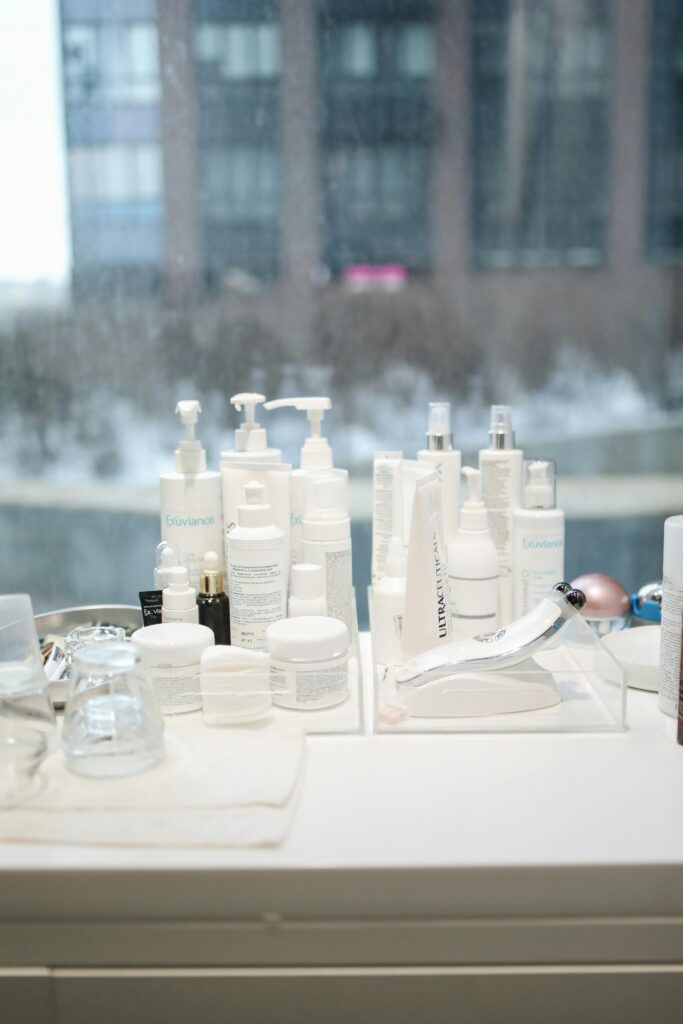The 5 Basics of Skincare: Your Comprehensive Guide to Glowing Skin
Knowing the basics of skincare is essential if you want perfect skin. Whether you’re new to skincare or want to improve your regimen, knowing these five simple steps can really help. This tutorial will lead you through each stage, outlining the significance, methods, and advice for the best outcomes. A comprehensive strategy will help you attain the healthy, radiant complexion you’ve always wanted.

Cleansing: The Foundation of a Solid Skincare Routine
The basis of any successful skincare regimen is cleaning. Your skin comes into contact with debris, pollutants, perspiration, and other contaminants during the day, which can clog pores and cause a range of skin problems. When these pollutants are removed by cleansing, your skin is left clear and prepared to receive the advantages of additional skincare products.
Why Cleansing Matters in Basics of Skincare
Cleaning not only gets rid of dirt and debris but also gets your skin ready to absorb the active components in the products you use later. Your skincare regimen is less effective if your skin isn’t properly cleansed because the ingredients can’t get deeply into your skin.
Choosing the Right Cleanser
Selecting the right cleanser depends on your skin type:
Oily Skin: Look for gel or foaming cleansers that help control excess oil production without stripping the skin of its natural moisture.
Dry Skin: Opt for cream or oil-based cleansers that provide hydration while cleansing.
Sensitive Skin: A gentle, fragrance-free cleanser is best to avoid irritation.
Combination Skin: A balancing cleanser that targets oily areas while hydrating dry zones works well.
Cleansing Tips
Wash your face in the morning and at night.
To prevent depriving the skin of its natural oils, use lukewarm water.
To guarantee thorough cleaning, massage the cleanser into your skin for approximately sixty seconds.
Use a gentle towel to pat your skin dry rather than rubbing it.
Exfoliation: Reveal a Smoother, Brighter Complexion
Exfoliation is the process of cleaning your skin’s surface of dead skin cells. Maintaining a flawless, radiant complexion depends on doing this action. Dead skin cells can build up and make your skin appear lifeless, clog your pores, and impair the efficacy of skincare products.
Types of Exfoliation
Physical exfoliation: This method involves physically removing dead skin cells using brushes or scrubs. Although this technique can be useful, it should be applied carefully to prevent tiny tears in the skin.
Chemical exfoliation: Dissolves dead skin cells by using acids such as beta hydroxy acids (BHAs) or alpha hydroxy acids (AHAs). Over time, this approach tends to be more gentle and efficient.
Benefits of Exfoliation in Basics of Skincare
There are following benefit of Exfoliation in Basics of Skincare:
opens pores and lessens the chance of outbreaks.
encourages the turnover of cells, resulting in skin that appears younger.
increases the effectiveness of skincare products by assisting them in penetrating deeper.
enhances texture and even out skin tone.
Exfoliation Tips
There are following Exfoliation Tip in Basics of Skincare:
If exfoliation is new to you in particular, start out slowly and increase the frequency gradually.
Based on your skin type, use physical exfoliants once or twice a week.
Observe the directions on chemical exfoliants; some are meant to be used once a day, while others are best used less frequently.
Since exfoliation might increase your skin’s sensitivity to UV radiation, always use a moisturizer and sunscreen afterward.
Moisturizing: Hydrate and Protect Your Skin Barrier
Not just dry skin, but all skin types require moisturizing. It keeps your skin moisturized, supple, and resistant to environmental aggressors by preserving its moisture barrier.



Understanding the Importance of Moisturizing in context of Basics of Skincare
In order to stop moisture loss and keep your skin from getting dry and irritated, moisturizers function by retaining water in your skin. Additionally, they build a barrier on the skin’s surface that can assist keep active chemicals in and support the general health of the skin.
Types of Moisturizers
Humectants: Substances that pull moisture from the air into the skin, such as glycerin and hyaluronic acid.
Emollients are substances that soften and smooth the skin, such as fatty acids and ceramides.
Occlusive: Substances that form a barrier to stop moisture loss, such as petrolatum and dimethazone.
Choosing the Right Moisturizer
Oily Skin: Opt for lightweight, non-comedogenic moisturizers that won’t clog pores.
Dry Skin: Rich, cream-based moisturizers with occlusive agents work best.
Sensitive Skin: Look for moisturizers with soothing ingredients like aloe vera or chamomile.
Combination Skin: Use a balancing moisturizer that hydrates without feeling greasy.
Moisturizing Tips
There are the following Moisturizing tip That play a vital Role in the Basics of Skincare
To seal in moisture, apply a moisturizer right away after cleansing and exfoliating.
Different moisturizers should be used for day and night. While nighttime formulations may contain additional chemicals like retinol, daytime moisturizers typically incorporate SPF.
Remember that your décolletage and neck also require hydration.
Sun Protection: Safeguard Your Skin from Harmful UV Rays
The next Step in Basics of Skincare is Sun Protection. A thorough skincare regimen must include sun protection. Skin cancer, hyperpigmentation, and premature aging are primarily caused by exposure to ultraviolet (UV) rays from the sun. As a result, using sunscreen every day is crucial to preserving the health and beauty of your skin.
The Importance of Sunscreen
Sunscreen play an important role in Basics of Skincare. Sunscreen protects your skin from UVB rays, which cause sunburn and play a role in the development of skin cancer, as well as UVA rays, which age and wrinkle your skin. You can lessen your chance of getting sun damage, such as dark spots and fine wrinkles, by using sunscreen every day.
Types of Sunscreen
There are different types of sunscreen that are used in Basics of Skincare:
Physical (Mineral) Sunscreens: These have materials that lay on top of the skin and reflect UV light, such as titanium dioxide or zinc oxide. They provide broad-spectrum protection and are appropriate for skin that is sensitive.
Chemical sunscreens: Include compounds that block UV rays before they reach the skin, such as oxy-benzone or avobenzone. They are more enticing for everyday use because they are often lighter and less prone to leave a white cast.
Choosing the Right Sunscreen
Choosing the right Sunscreen is important step in Sun Protection (Basics of Skincare)
For everyday use, use a broad-spectrum sunscreen with at least SPF 30.
Take into account your skin type. Oily skin types might want a matte finish, while dry skin types might benefit from a formula that is more moisturizing.
Reapply as soon as possible after swimming or perspiring, and every two hours when exposed to the sun.
Sun Protection Tips
There are the following Sun Protection tips That play a vital Role in the Basics of Skincare:
After applying moisturizer, put on sunscreen as the last step in your morning skincare routine.
Remember to pay attention to your neck, hands, and ears.
To keep your lips safe, use an SPF-containing lip balm.
Make wearing sunscreen a regular habit because UV radiation can still penetrate the skin on cloudy days.
Consistency: The Secret to Skincare Success
Consistency is the most important step of Basics of Skincare.The secret to getting and keeping healthy, glowing skin is consistency. The goal of skincare is to establish a routine that you can maintain and modify as your skin changes over time, rather than focusing on immediate solutions.
The Importance of a Consistent Skincare Routine
Maintaining a regular practice enables your skin to adapt to cosmetics and fully absorb active ingredients. It supports long-term skin health and aids in preventing problems before they emerge. That’s why consistency is most important step in basics of skincare.
Building a Routine
Begin with basics: Pay attention to the essentials: moisturizing, cleaning, and sun protection. After mastering these procedures, you can incorporate treatments such as exfoliants or serums.
Suit Your Skin’s Requirements: Age, stress levels, and the changing of the seasons all affect your skin. Adapt your routine to new issues as they arise.
Have patience: The majority of skincare products require time to start working. Allow new products to sit for a minimum of four to six weeks before assessing their efficacy.
Consistency Tips
Include your skincare regimen in your regular self-care practice.
To increase the likelihood that you will use your products frequently, keep them easily accessible.
To stay motivated, keep a skincare notebook or take pictures of your progress.
Conclusion
Achieving healthy, beautiful skin requires mastering the five fundamentals of skincare: washing, exfoliating, moisturizing, protecting against the sun, and consistency. You’ll set the stage for lifetime skin health by adding these actions into your regular regimen. Recall that getting excellent skin is a marathon, not a sprint. Take your time, be reliable, and have fun while taking care of your skin.
For more detail related to Basics of Skincare visit site Neutriherbs

Pingback: 7 Health Benefits of Olive Oil on Skin: A Natural Elixir for Youthful Glow - Fusion Feast
Pingback: Top 7 Skincare Brands: Elevate Your Beauty Routine with the Best in Skincare - Fusion Feast